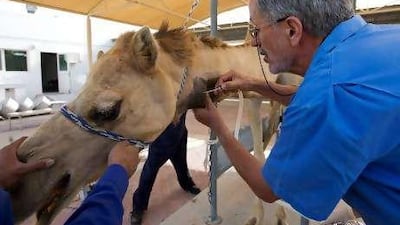DUBAI // Antivenin developed from camel antibodies will be in use in Africa within two years to treat victims of snake bites, the head of a laboratory in Dubai said yesterday. Researchers from Britain and the Central Veterinary Research Laboratory (CVRL) in Dubai have collaborated to use camels instead of the more usual horses or sheep as incubators for a new antivenin - the antitoxins that counteract specific snake venoms.
Yesterday, the team released the results of the first phase of the research. Camel antibodies were found to be as effective as sheep and horse antivenins. But they are smaller, cheaper and can be stored unrefrigerated, which makes them an attractive alternative. Around 40 camels were injected with tiny amounts of the toxins from snakes commonly found in Africa - the puff adder, the saw-scaled viper and the black spitting cobra. Over the past six months, the CVRL has extracted about 70 litres of antivenin serum, which will be refined to seven litres of antivenin, enough to treat 1,000 snakebites. "We've shown that we can consistently create high quality antivenin at a certain yield, that the product is biologically active and economically viable," said Dr Hedwig Reichl, whose Austrian company, Haemosan LSS GmbH, developed the machines to purify the antivenin. "Next, we have to industrialise the collection of it." The second phase of the project is clinical trials on mice, which may begin as early as next month, before testing on humans. The CVRL has fitted two rooms with equipment worth Dh3 million to produce the antibodies needed for the antivenin. "This is just the beginning. We want really to go big, and use the same technology to make vaccines for diseases such as polio, tuberculosis, malaria and even HIV. All of this has real future prospects," Dr Ulrich Wernery, the scientific director of the CVRL, said. "Maybe someday we'll have our own institute," he added. The study found that while camel-incubated venom was equally effective as horse and sheep-incubated venom, there were some advantages. The team believes that the camel antivenin could create fewer adverse effects. "This could have potentially huge benefits, but that can only be determined in the clinical trials. Since we're looking for adverse effects the trials will have to be very big," said Dr Rob Harrison, the head of the Alistair Reid venom research unit at the Liverpool School of Tropical Medicine, a partner in the project. Current antivenins frequently cause allergic reactions that can be severe and result in death. But the size of camel antibodies could create a breakthrough treatment. Horse and sheep antibodies are too large to move through the human tissue wall, making them unable to stop the death of living tissue as the toxins from venom spread. Scientists think that camel antibodies, which are about one-tenth the size of those from horses or sheep, will be able to pass through the tissue wall to prevent the spread. Antivenin is produced by injecting small amounts of toxin into animals and then harvesting the antibodies, the proteins produced by the immune system to fight viruses, bacteria and venom. Current antivenins need to be kept frozen, which can be challenging in parts of Africa, where most snake-bite fatalities occur but where electricity supplies are unreliable. As a result, treatments have a short shelf life. Dr Wernery believes that camel antibodies are "special" because of the animal's ability to survive in harsh environments. Researchers think that the camel antibodies are more resistant to heat, and will be able to be kept at room temperature. Treatments are prohibitively expensive for many people in rural areas of Africa. With few customers for antivenins, big pharmaceutical companies largely halted production a decade ago. @Email:mdetrie@thenational.ae
Researchers injected camels with tiny amounts of the toxins from the African snakes. The team then collected 250 millilitres of blood from each camel weekly to test whether the animal had started to produce antibodies. Each animal produces antibodies at a different rate. Once the level of antibody production peaks, more blood is collected. The blood is then left at room temperature for up to six hours so that the serum, the part of blood containing the antibodies, becomes separated from the blood cells. The serum is mixed in a large glass container, which has two walls separated by a fluid similar to radiator fluid, which is processed to keep the temperature at 32°C. Then begins the rigorous process of destroying any viruses in the serum and separating the antibodies through a process called precipitation, which condenses all of the other parts of the serum into sludge. Once the serum is separated, the antibodies are placed in a device that uses centrifugal force to reduce the antivenin. The whole process takes a week, and by the end, 150 litres of serum is concentrated to five litres of antivenin.

